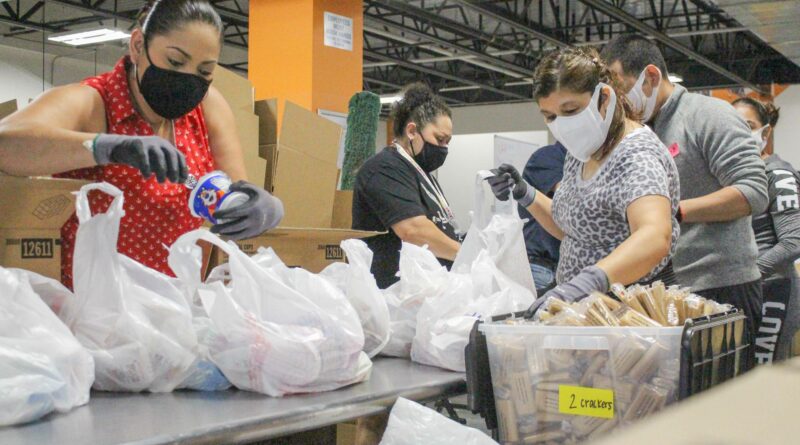‘How Am I Going to Feed People?’
Preston Hollow’s Anurag Jain talks about the pandemic-borne Get Shift Done
When restaurants and shops across North Texas closed last spring when the pandemic hit, Preston Hollow’s Anurag Jain had one prevailing thought.
“‘How am I going to feed people?’ was my immediate concern,” he said, adding that his involvement with the North Texas Food Bank made him keenly aware of how hard it was about to become for a lot of people.

Jain, who is chairman of Access Healthcare and managing partner of Perot Jain, worked with his business partner, Patrick Brandt of Shiftsmart, to come up with a solution to twin issues – an increased need for the services many nonprofits like the NTFB provided, and a lack of volunteer availability because of COVID-19.
The result was Get Shift Done, which provided many suddenly unemployed with an income in exchange for working for those nonprofits. Launched in March, Get Shift done has now grown to 10 additional cities, and has helped serve more than 50 million meals with 22,000 workers helping 110 nonprofit partners.
Brandt’s connections to the restaurant industry, which Jain was well aware of since Perot Jain provided early seed money for Shiftsmart, helped propel the effort.
We had a conversation with Jain about his efforts. An excerpt is provided below, and you can see the full discussion at peoplenewspapers.com.
PN: The pandemic hits in March, and suddenly a whole lot of people are out of a job, and have no idea if that job will come back. What was your first thought?
These workers needed income and were looking for work so they would not find themselves requiring the services of the NTFB.
Jain: “How am I going to feed people?” was my immediate concern. I knew by my involvement with North Texas Food Bank (NTFB) and other hunger-related organizations that 1 in 6 people in the United States were already requiring hunger relief assistance and this number would increase due to shelter in place requirements and the unfortunate loss of work for many employees because of COVID.
I assessed the concerns of food inventory, food supply, and whether the process of food packaging would change because of COVID but I seriously worried about where will I get the volunteers to help the NTFB distribute the food? At the NTFB, we serve over 78 million people each year in the North Texas area with donated time by many dedicated volunteers.
The answer came as a result of my relationship with a business that works in the restaurant/hospitality industry who had out-of-work hourly employees because of restaurant closing. These workers needed income and were looking for work so they would not find themselves requiring the services of the NTFB. The concept of bring together ‘people who know food helping people who need food’ set the Get Shift Done program in motion.
PN: How important was it to you and Patrick to create this mechanism that helps two issues that have dovetailed during the pandemic – unemployment, and an increased reliance on food banks that are short volunteers because of COVID?
He was so excited to have work that he arrived early and stayed late to help clean up and prepare for the next shift.
Jain: We both had an immediate need – I needed volunteers to assemble and distribute meals to those in need and Patrick needed to help out-of-work restaurant employees earn an hourly during the economic downturn due to COVID. Next step was to create a list of generous donors who would deeply care about helping their community in need and help us pay the wages for these talented and eager workers.
Through the help of NTFB and the Communities Foundation of Texas, we worked to identify other hunger-relief organizations such as food pantries, Meals on Wheels, churches, and school districts that needed help with food distribution. Patrick is president of Shiftsmart, which is an online software platform arranging shifts for restaurant/hospitality workers.
I knew Patrick because I provided early seed funds of investment in Shiftsmart with my venture capital company and Shiftsmart had the relationship with restaurant owners and groups to identify out-of-work employees along with the mechanism to place the workers in the various nonprofit locations, especially the NTFB.
We were overwhelmed with the positive and enthusiastic response by the employees wanting to help their community and earn wages at the same time.
On the first day of the Get Shift Done program at the NTFB, one worker took two buses and a train to arrive at the Plano location. He was so excited to have work that he arrived early and stayed late to help clean up and prepare for the next shift. He had not known of food insecurity before COVID and vowed to continue volunteering at the food bank after he resumes his restaurant job.
After we launched the Get Shift Done program in North Texas, several cities throughout Texas and in other states contacted us asking to duplicate this effort for their community. In just under 200 days, we have served over 50 million meals in 11 regional areas and paid over $6 million plus in wages.
Patrick and I are both entrepreneurs, serial entrepreneurs really, so recognizing the need and finding a solution was not an overwhelming burden for us. We jumped right into start up mode and got the right people and right partners in place to hit the ground running within a few hours of our first call to each other.
Thanks to NTFB, Communities Foundation of Texas, and all the generous donors and hardworking employees, we were able to help our neighbors and communities in a most meaningful way.
PN: Dallas has been kind of known for being a giving town. Was it easy to get people on board with what is kind of an out-of-the-box idea?
I’ve met so many wonderful people, so many hardworking employees, generous donors, nonprofit and community leaders during these past months. They all jumped in and created something bigger than themselves.
Jain: Yes! Patrick and I have been involved in our community in various ways so we had created great relationships over the years combined with our solid business reputations to make the ask and have an immediate and willing response of donations. In addition to individuals, foundations and corporate support, we were quite taken with others who found creative ways to help us raise funds.
One musician dedicated his tip jar earnings through his online and Facebook performances to Get Shift Done, children collecting small change to help provide meals for kids who are without right now, and one worker donating her government supplemental stipend check of $1,200 to the fund as she told us that others need it more than she does.
I’ve never been involved in something so heartfelt like Get Shift Done and I am grateful for this opportunity to join others with kind and generous hearts and pocketbooks. I’m overwhelmed with emotions at times because of the impact this idea has had and the lives that have been touched.
I’ve met so many wonderful people, so many hardworking employees, generous donors, nonprofit and community leaders during these past months. They all jumped in and created something bigger than themselves.
PN: What is your personal philosophy when it comes to addressing large-scale problems?
Together we created the solution.
Jain: Community involvement, philanthropy and corporate social responsibility are core tenets in my personal life and business. My family and my professional colleagues are all dedicated to service and we are often engaged in various ways of helping others in need.
joined the NTFB board when I saw a billboard off the freeway regarding the work of the food bank. I saw a face on the billboard that looked very similar to a gentlemen I knew who was recently laid-off from his work and asked “how am I going to pay my mortgage, how am I going to put food on the table.” That billboard activated a desire in me to call the food bank and ask how I can help.
I hadn’t lived in Dallas very long when that happened. From there, I joined other nonprofit organizations and school committees where we tackled small and large-scale problems. At the NTFB, we ran a $55 million capital campaign to build the Plano facility that took everyone on the board to call their friends and acquaintances to help with the fundraising requirements.
Having run my own businesses and worked for large corporations in addition to serving on nonprofit boards, I have learned to look at a problem in a 3-dimensional aspect. I separate the problem into various parts, identify the desired outcome and select the right people to accomplish their part so that together we can create the solution.
Often you hear, it’s all about who you know. Well, to get to that place of having a great network of talented and knowledgeable people you can call on, it first takes hard work to know the working environment, produce excellence in performance and/or product, be consistent in performance and keeping your word to have others know and believe in you. Once that is established, then you can call on those individuals you’ve created relationships with to willingly engage and support the projects you propose or ask their help with – it then is easy to bring others into the task at hand.
That’s what happened with Patrick and Shiftsmart. The partnership and friendship with Patrick led to Get Shift Done with many donors, community leaders and restaurant workers to help us accomplish the desired outcome of feeding as many people as we could. Together we created the solution.





